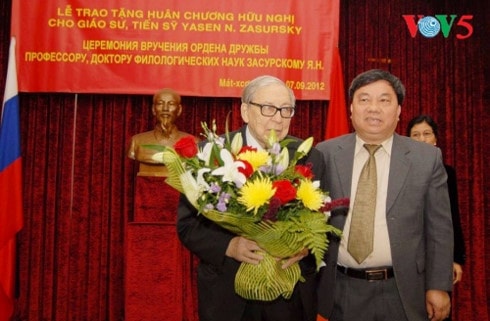The story behind the song 'Listening to the folk song in the middle of Moscow'
The song "In the middle of Moscow, listening to the folk song" has moved listeners for decades every time it is played.
"Giua Tu Khoa nghe cau ho vi dam" is a song that is familiar and loved by Vietnamese music lovers. The song was composed by musician Tran Hoan from the lyrics of poet Do Quy Doan. The poet revealed that the work was born in 1981, when the two men were studying in the capital of Russia. Now, every time the song is played, emotions about Russia come flooding back to the memory of the poet - a former student of Lomonosov State University, former Deputy Minister of Information and Communications.
 |
| Mr. Do Quy Doan (right) and his former teacher - Professor, Dr. Yasen Zasurskiy at the Friendship Medal Awarding Ceremony for the Professor in Moscow, Russia. Photo: Provided by the character. |
Although more than 30 years have passed, the memories of his years studying in Russia are still intact in the memory of journalist and poet Do Quy Doan.
One of the most beautiful memories is the one between him and the late musician Tran Hoan. In the distant land of Birch, a famous musical work was born from the harmony between the two artists' souls when they remembered their homeland. The song "Giua Tu Khoa nghe cau ho vi dam" every time it was played moved listeners for decades. The name of the song itself expressed the feelings of those far from home.
Mr. Do Quy Doan recalled: “One autumn afternoon in 1981, when I was studying at Lomonosov University, and musician Tran Hoan was studying at the Academy of Sciences under the Central Committee of the Communist Party of the Soviet Union. That afternoon, there was a program of the Bong Sen art troupe performing in Moscow, in which singer Hong Van sang the song “Giận thì đăng, thương thì thương”, a folk song of Nghe Tinh. At that time, the blue sky was very beautiful, the mood of people far from their homeland when listening to folk songs was unbearable. After that program, the two brothers went for a walk on Lenin hill, now Chim Se hill, when Mr. Tran Hoan asked me to write the lyrics. So when I got home, I sat down and wrote for 2 hours, then gave it to the musician and he started sitting with his guitar to compose the music.”
The song was then brought back to Vietnam by musician Tran Hoan for further editing in the same year and gradually became popular throughout the country. Since then, the song “Giua Mo Tu Khoa nghe cau ho vi dam” has always been loved by Vietnamese students studying in Russia on every occasion of meeting, as if to somehow ease their homesickness for their homeland and Fatherland.
Having lived far away from her hometown of Nghe An for many years, where the folk song Vi Giam is found, Ms. Tran Thi Hung, working in Hanoi, said about this song: “This song is famous not only in Vietnam, but also in many countries. Overseas Vietnamese feel very emotional every time they hear this song, especially those who are from Nghe An, they are very moved and have a feeling of warmth and closeness to their homeland.”
For journalist and poet Do Quy Doan, his vibrant student years from 1980 to 1986 always left him with beautiful, unforgettable memories. Every street, every forest, every row of birch trees, winter, autumn or spring - all those images are deeply imprinted in his memory.
Now, every time he listens to this song, memories of the country where he lived for such a long time come back to him: “It can be said that in my life and work, the foreign country where I have lived the most is Russia, and the memories of Russia will never fade in my memory. My time studying at Lomonosov University was quite long, especially during the 6 years I lived in only one dormitory, so everything became familiar. The forests, the snow-covered winter roads..., all those images I will never forget. Especially the hearts of the Russian people, they are extremely kind and sincere people.”
Former Deputy Minister of Information and Communications Do Quy Doan still considers himself lucky to have the opportunity to work in Russia every year. Every time he returns to this country, he visits his old school and his respected teacher, Professor, Dr. Yasen Zasurskiy, former Head of the Faculty of Journalism and currently Chairman of the Faculty of Journalism of Lomonosov University. Russia, Russian people and Russian nature always leave deep memories in the life of journalist and poet Do Quy Doan. Those are memories that will forever be associated with his feelings and thoughts until the end of his life./.
According to VOV
| RELATED NEWS |
|---|

